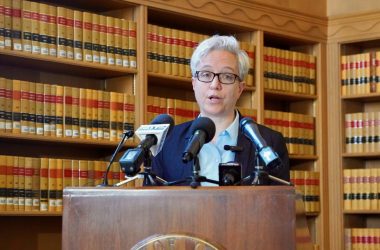Troubled by a steep rise in attempts to ban books in Oregon and nationwide, state Sen. Lew Frederick proposed what he sees as a simple bill.
Oregon law already bans discrimination in education and requires that textbooks address the contributions various groups of people have made to Oregon and American history. Frederick introduced Senate Bill 1583 to prevent school boards and district personnel from banning textbooks or library books just because they include stories about people of color, LGBTQ+ people, religious people, people with disabilities or any other group protected from discrimination.
The bill wouldn’t stop districts or school boards from deciding which books to include in a local curriculum or a school library. And parents or guardians would still be able to decide what books their own children are able to read or check out from school libraries.
“It’s not telling people that they have to read certain things,” Frederick, D-Portland, told the Capital Chronicle. “There’s none of that. It’s just saying that these books that are in your libraries are books that are part of the whole library. They’re going to be there. It’s not forcing anybody to do anything.”
But Frederick wasn’t prepared for the reaction, or for his bill to become the latest culture-war issue rocking the Oregon Legislature in a five-week session that’s supposed to be focused on housing and addiction. By Monday afternoon, a full 24 hours before a scheduled hearing, more than 500 people had submitted written testimony about the measure. That’s more comments than lawmakers received about Gov. Tina Kotek’s $500 million housing bill or nearly any other measure considered this year.
Republican Rep. Ed Diehl of Stayton, a first-term lawmaker, called Frederick’s bill the “worst I’ve seen so far” in an email urging parents to show up for the hearing. He built a following last year by agitating against a new law that requires insurance companies to cover any gender-affirming treatments prescribed by a doctor.
More opposition came from a pseudonymous Twitter account with nearly 30,000 followers: It posted a glossy campaign-style ad against the proposal, replete with archival legislative video and stock footage of parents and children. The two-and-a-half-minute video doesn’t include any disclosure of who paid for it.
The bill’s supporters leapt into action, with the Oregon Education Association and the American Civil Liberties Union sending their own email blasts urging supporters to submit testimony and show up to the Capitol.
Personal experience
Frederick didn’t work with educators, librarians or other groups when he drafted the bill, and organized support only appeared in response to attacks from conservative activists. He drew instead on his experience as a former teacher and public information officer in Portland Public Schools and the values he learned growing up.
Frederick’s paternal grandparents were teachers and sharecroppers who left Mississippi because they weren’t allowed to teach Black children to read. His father went on to become a mycologist – a scientist who studies fungi – and Frederick grew up as a “faculty brat,” surrounded by books.
His parents were active in the Civil Rights Movement, and Frederick was one of the first Black students at his Atlanta high school in the 1960s. As a young man, he lived the history that he fears is now being censored – schools in Florida, for instance, have banned or refused to purchase children’s books about civil rights pioneer Rosa Parks.
In his office, flanked by bookshelves crammed with a random assortment of books, Frederick said it was important that people have the ability to read what they choose, even if the subject matter is disagreeable. He disagreed with parents’ efforts to ban Mark Twain’s “The Adventures of Huckleberry Finn” and cancel a field trip to see a performance of William Shakespeare’s “The Winter’s Tale” when he was a teacher, and he thinks teachers in a Seattle suburb who tried to ban “To Kill a Mockingbird” over concerns that it was a “white savior narrative” were making a mistake.
“I disagree with a number of books,” Frederick said. “Even some of those over there I disagree with vehemently, but I have read them so that I can understand what’s being said and why it’s being said and how it fits into a world view.”
Bans spread
Public schools and libraries have long been the battlefront in America’s culture wars, and book bans aren’t anything new. But they’ve grown in recent years: the free speech advocacy group PEN America tracked nearly 3,400 instances of book bans in the 2022-23 school year, up from 2,500 in the 2021-22 school year.
At the state level, the Oregon Intellectual Freedom Clearinghouse run by the Oregon State Library tracked 93 attempts to remove books or other materials at libraries throughout the state between July 2022 and June 2023.
“No matter the stated reason for a challenge, one pattern is clear: Challenged materials are disproportionately about, by or center the story of people from an underrepresented race, color, national origin, sex, sexual orientation, gender identity, age or disability – the same groups protected from discrimination by ORS 659.850,” state librarian Wendy Cornelisen wrote to lawmakers. “Over 70% of the items challenged in 2022-23 focus on one or more of those identities.”
State law now requires that instructional materials for American history and government classes include the role of Native Americans, people of European, African, Asian, Pacific Island, Chicano, Latino, Middle Eastern or Jewish descent along with immigrants, refugees and people with disabilities or who are lesbian, gay, bisexual or transgender.
The state library’s report includes Oregon’s most recent school book ban, when the Canby School District temporarily removed 36 books from high school and middle school libraries in response to parent complaints. After months of deliberating, the district decided to permanently ban just one book, Vladimir Nabokov’s “Lolita,” while restricting three fantasy novels and one historical fiction book to high school libraries, the Oregonian/OregonLive reported.
Most of the books challenged in Canby were written by women, and many featured people of color and LGBTQ+ people. The list included modern classics like Toni Morrison’s “Beloved” and “The Bluest Eye” and Margaret Atwood’s “The Handmaid’s Tale,” as well as books by authors John Green and Rainbow Rowell, mainstays of young adult literature.
Tamara Quandt, an elementary school teacher and parent in the district, told the Capital Chronicle it was clear that some parents and school board members were specifically targeting books about LGBTQ+ people and people of color.
“The people championing it were definitely driven by a political agenda and used a lot of religious rhetoric, but they were very careful,” Quandt said. “They had talking points that had come from outside organizations and knew they couldn’t say ‘We want these books removed because we don’t want LGBTQ characters.’ They would always use that there was just sexual content or inappropriate content for students.”
Concerns about sex
Most of the written testimony submitted to the Legislature focuses on concerns about sexually explicit materials.
“We do not want more racist and LGBTQ information shoved into the faces of our kids. It is everywhere, it doesn’t need to be in the textbooks. They need to learn reading, writing and math, not other agendas,” Monica Carroll of Medford wrote in one representative message.
Diehl, the Stayton Republican, rallied conservatives to the Capitol to protest the bill but didn’t respond to an interview request. In his email newsletter, he described the measure as an attack on schools, parents and students.
“The bill is thinly disguised as protecting against discrimination,” Diehl wrote. “But the intent is clear – to prevent local school boards from removing ideologically driven content that could harm our kids. They are doing this because all across Oregon, communities are pushing back against this agenda that goes against their values and common sense.”
A hearing on Senate Bill 1583 is scheduled for 3 p.m. Tuesday in the Senate Education Committee, with a possible vote on Thursday.
Oregon Capital Chronicle is part of States Newsroom, a network of news bureaus supported by grants and a coalition of donors as a 501c(3) public charity. Oregon Capital Chronicle maintains editorial independence. Contact [email protected]. Follow Oregon Capital Chronicle on Facebook and Twitter.




